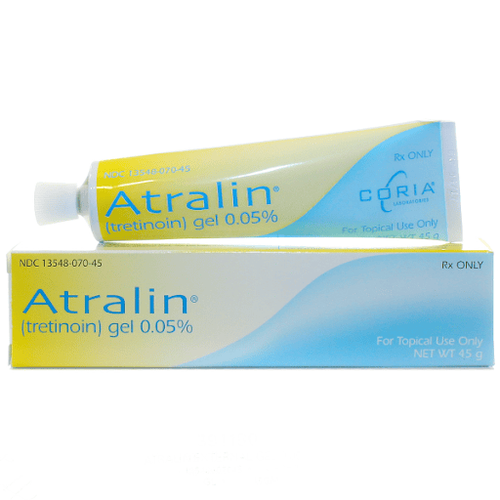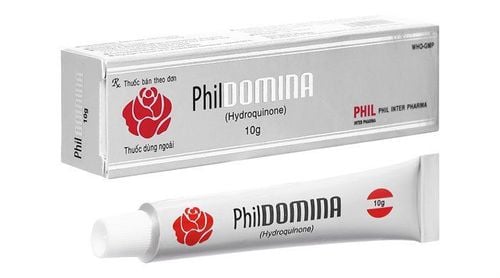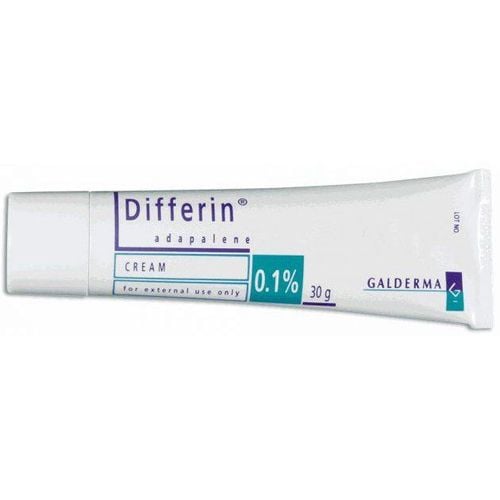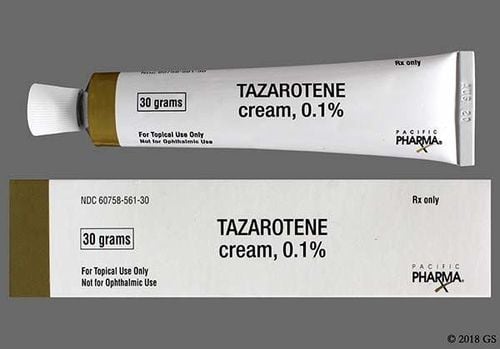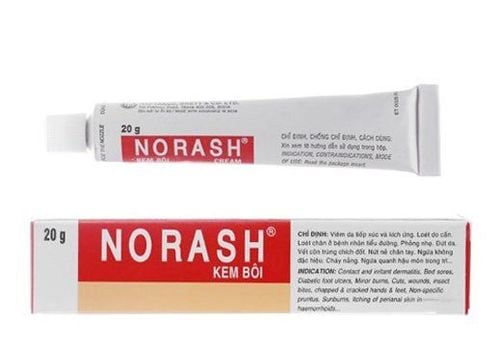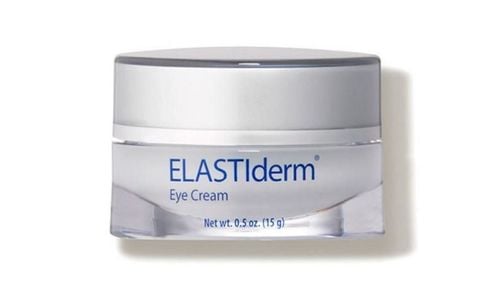This is an automatically translated article.
Retinol is one of the most well-known skin care ingredients on the market, when it comes to helping treat skin problems like: aging, acne. This product is an over-the-counter (OTC) of retinoids, retinols are derivatives of vitamin A
1. What does retinol do?
Retinol is one of the most well-known skin care ingredients on the market, when it comes to helping with skin problems like skin aging, acne, and pitting retinol.
Retinoids are not the same products as prescription retinoids, which are more potent. However, retinol remains the most potent over-the-counter product available compared to other over-the-counter retinoids such as retinaldehyde and retinyl palmitate. Retinol has many potential skin care benefits, but there are also side effects that need to be carefully considered before using.
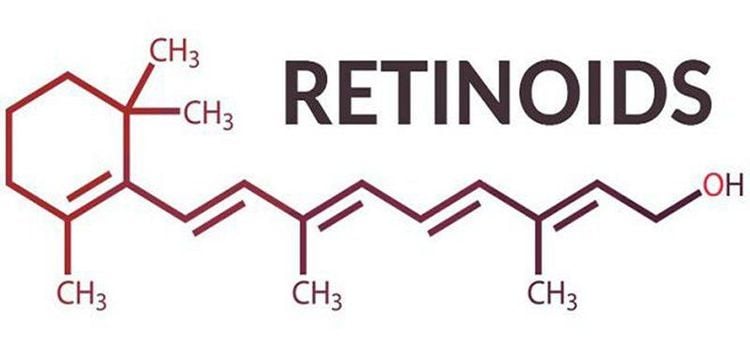
Retinols là các dẫn xuất của vitamin A được sử dụng nhiều trong chăm sóc da
2. How does retinol work?
Retinol is a type of retinoid, made from vitamin A. Instead of removing dead skin cells like many other anti-aging and acne products do, the small molecules that make up retinol travel deep under the epidermis (the outermost layer of skin) to the dermis of your skin.
When entering the middle layer of the skin, retinol works to neutralize free radicals to promote elastin and collagen production. This creates a “fullness” effect that reduces the appearance of fine lines, wrinkles and enlarged pores. At the same time, retinol works to exfoliate the skin's surface, which can further improve skin's texture and tone.
Retinol can also help treat severe acne, as well as scarring caused by acne. It helps keep your pores unclogged by producing acne resolvers to prevent breakouts or cysts from forming.
For severe acne, a dermatologist may prescribe antibiotics in combination with retinol for the best treatment. Remember that it can take up to six weeks for you to see improvements in your acne.
Finally, retinol has been shown to balance skin hydration levels. The effect removes dead skin cells, which can lead to loss of skin moisture. This can even be beneficial for those with oily skin, as it helps control the overproduction of sebum in the pores.
3. In what cases is retinol used?
Currently Retinol is mainly used to treat the following skin conditions:
Acne Crow's feet Wrinkles Age spots, freckles and other signs of sun damage, sometimes is called the influence phenomenon. Uneven skin texture. Melasma and other types of hyperpigmentation. Large pores due to acne, oily skin or loss of collagen. To get the best results from a retinol-containing skin care product, you must use it daily. It may take several weeks until you notice significant improvements.
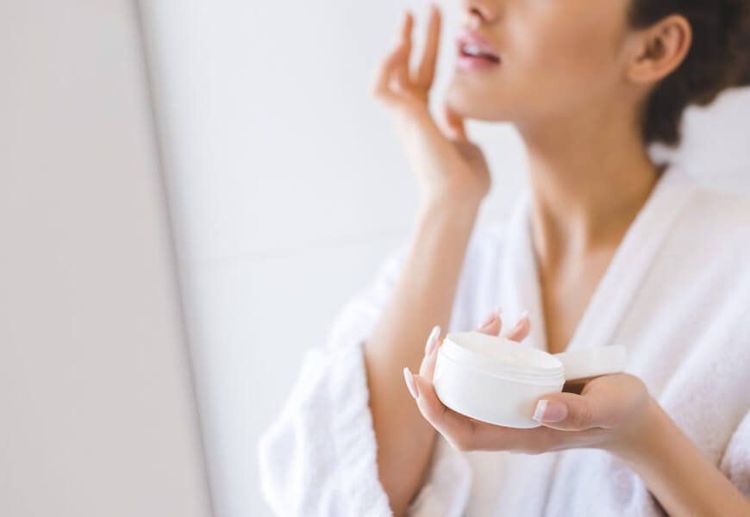
Nên kết hợp retinol cùng kem dưỡng để giảm kích ứng của hoạt chất trên da
4. Retinol Side Effects
Although retinoids, including retinol, have been approved by the US Food and Drug Administration (FDA), this does not mean that they are free of side effects. People who use retinol often experience dry and irritated skin, especially after using a new product.
Other possible side effects when using retinol include:
Redness Itching Itching Peeling skin. These side effects are usually temporary and are likely to improve within a few weeks as your skin gets used to the retinol product. However, if you continue to experience skin irritation, you may want to consider finding an alternative with a lower concentration product.
Applying retinol 30 minutes after washing your face can also reduce skin irritation. Another possible solution is to reduce the frequency of use of the product. You can take the retinol every other day and gradually increase your skin's tolerance to the retinol before switching to daily use.
The risk of side effects can also be greater if you use more than one product containing retinol at the same time. Carefully read the labels of the products you're using, especially if you're using a combination of anti-aging and acne-fighting products, there's a good chance they both contain retinol. Due to the risk of sun sensitivity, the best time to use retinol is at night.
5. Be careful when using retinol
Sunburn is one of the biggest risks when you use retinol. Some of the side effects of retinol that are drying and skin irritation can also be made worse by sun exposure. Sun exposure can put you at risk for some of the key symptoms you're using retinol to treat, such as age spots and wrinkles. To reduce these risks, apply sunscreen every time you go outside and avoid direct sun exposure as much as possible.
Pregnant women are not recommended to use products containing retinol. They can increase the risk of birth defects and cause miscarriage. Talk to your doctor about retinol if you think you are pregnant or plan to become pregnant at some point in the near future. Your doctor may recommend that you use birth control while you are using retinol.
Some concerns have also been raised about the long-term carcinogenic side effects of retinol based on rodent studies. However, we still need more human studies to confirm these risks.

Phụ nữ mang thai không được sử dụng các sản phẩm chăm sóc da có chứa retinol
6. When to see a doctor?
Retinol products are available without a prescription, but you may want to consider talking to your dermatologist before using them. Your doctor can help you assess your overall skin condition and recommend suitable products based on your individual needs.
Also, if you're not seeing results from conventional beauty products, your dermatologist may recommend a prescription retinoid. Prescription retinoids include:
Tazarotene (Tazorac) for wrinkles Tretinoin (Retin-A) for wrinkles Adapalene (Different) for acne Isotretinoin (Accutane) for severe acne Despite the formulation of these ingredients Prescription products are indeed stronger, but this also means they have a higher risk of side effects. You need to follow your doctor's instructions and apply sunscreen every day.
If still not seeing the desired results after trying a prescription retinoid for several weeks, your dermatologist may suggest other options such as:
Alpha-hydroxy acids like glycolic and citric acids for anti-aging. Beta-hydroxy acid (salicylic acid) works to help improve skin texture and acne. Chemical peels to help shed the outer layer of skin to improve skin tone and texture. Exfoliation can also help with texture and tone. Fillers for wrinkles Laser treatment for hyperpigmentation, scarring and enlarged pores. Retinoids are known to be very effective in treating aging and acne-prone skin. Retinol is the most accessible form of retinoid, as well as a good choice for sensitive skin. If after several months of using a retinol you don't see significant improvements in skin tone, texture, or smoothness, consider seeing your dermatologist.
Currently, retinol products and cosmetics containing retinol ingredients are very popular on the market. In order to use the product effectively, with less side effects or skin irritation, you should talk to a dermatologist to get the most suitable advice for your current skin condition.
Please dial HOTLINE for more information or register for an appointment HERE. Download MyVinmec app to make appointments faster and to manage your bookings easily.
Reference source: healthline.com



